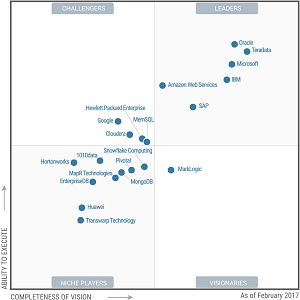News
Research: Cloud Impacts 'Data Management Solutions for Analytics'
- By David Ramel
- March 7, 2017
The latest Gartner Inc. report about the "Data Management Solutions for Analytics" market is still dominated by big, traditional vendors with on-premises legacy-like solutions, but cloud computing companies are making disruptive headway.
In the for-pay "Magic Quadrant for Data Management Solutions for Analytics" (DMSA) report, cloud vendors figure prominently and are "gaining traction," according to Gartner.
"Expectations are now turning to the cloud as an alternative deployment option, because of its flexibility, agility and operational pricing models," Gartner said. "As the use of a combined cloud and on-premises hybrid is quickly becoming the norm, so organizations expect vendors to support them in enabling such deployments."
Gartner's Magic Quadrant reports rank vendors according to their "ability to execute" and "completeness of vision," placing companies that excel on both indices in the "leaders" category of DMSA. That moniker refers to "a complete software system that supports and manages data in one or many file management systems (most commonly a database or multiple databases)."
In the new report, undisputed public cloud computing leader Amazon Web Services Inc. (AWS) joined the likes of more traditional data analytics companies such as Oracle, Teradata, Microsoft, IBM and SAP in the leaders quadrant.
 [Click on image for larger view.]
The Magic Quadrant for Data Management Solutions for Analytics (source: Gartner)
[Click on image for larger view.]
The Magic Quadrant for Data Management Solutions for Analytics (source: Gartner)
"Although the leaders quadrant this year is largely populated with large traditional vendors that are relatively close to each other, we also see a new entrant in AWS," the research firm said. "AWS has continued to focus on market execution, while also progressing its vision in addressing a broader set of use cases by combining and delivering multiple services to the market."
Gartner said that while it expects hybrid cloud and on-premises deployments to become the norm, interest is growing in cloud solutions as on-premises alternatives.
"More organizations are considering cloud IaaS [Infrastructure-as-a-Service] or PaaS [Platform-as-a-Service] as the means of deploying their analytical environments," the research firm said. "Although appealing in terms of the flexibility and agility of deployment and pricing, this approach will demand further support for hybrid on-premises and cloud options. This will set new expectations for the LDW [logical data warehouse], requiring new ways of managing access and processing needs across these hybrid environments. Cloud solutions are also challenging the traditional positioning of appliances, which is causing further disruption for traditional data warehouse vendors."
The company indicated that AWS rules the public cloud space with offerings such as: Amazon Redshift, a data warehouse service; Amazon Simple Storage Service (S3); Amazon Elastic MapReduce (EMR); and Amazon Athena, a serverless computing, metered query engine for data stored in Amazon S3.
"AWS is the dominant cloud vendor in this market by a significant margin, with only Microsoft Azure even close in terms of market share and presence," Gartner said in detailing the strengths of the AWS offering. "This dominance provides increasing network effects for all of its services, because the sources of data for a DMSA use case are more likely to reside in an AWS service than that of any other cloud vendor."
Other listed strengths of AWS include its several different services that can be found to provide a best fit for many DMSA use cases, along with its low-cost, pay-as-you-go pricing.
As far as "cautions" about AWS, Gartner cited: monolithic storage and compute sizes; being a cloud-only vendor; and integration issues.
"Amazon Redshift is available in configurations that include a specific amount of compute and storage," Gartner said about the first caution concerning monolithic storage sizes. "Customers cannot easily scale these resources independently without doing a resizing exercise, which takes several hours while data is redistributed. This can lead to excess capacity and a more cumbersome process to upgrade Redshift instances."
Meanwhile, being a cloud-only vendor leaves it out of contention in enterprises that need hybrid environments that also span on-premises implementations.
The final caution indicates that AWS's many options that provide the "best fit" advantage can also work against the company. "By offering multiple independent services, AWS can reduce the complexity of each individual service, but this can increase the work required to integrate the separate services," Gartner said. "At this point, integration requirements must be addressed by customers, so the proliferation of service instances can lead to significant integration issues."
In its concluding market overview, Gartner said: "The DMSA market continues to evolve. Customers now expect solutions that support all types of data for analytics and that take a coordinated approach. This demands different types of integrated solution and an interoperable services tier for managing and delivering data. Data lakes and the ability to manage streaming data are now being pursued by a growing number of organizations."
About the Author
David Ramel is an editor and writer at Converge 360.